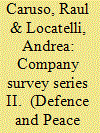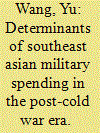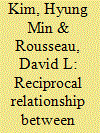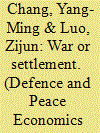| Srl | Item |
| 1 |
ID:
117692


|
|
|
|
|
| Publication |
2013.
|
| Summary/Abstract |
Finmeccanica is the eighth largest arms manufacturer on a world scale. The article explains and discusses its recent evolution. In particular, we discuss the broader privatisation programme implemented by the government as a response to the 1992 financial crisis. Finally, we will present our conclusions on how the interplay of domestic factors and external pressures accounts for Finmeccanica's peculiar trends. This result, especially Finmeccanica's performance, is the consequence of a deep transformation occurred in the past 10-15?years in both the industrial base and national defence policy. The two processes appear to be somehow interrelated.
|
|
|
|
|
|
|
|
|
|
|
|
|
|
|
|
| 2 |
ID:
117691


|
|
|
|
|
| Publication |
2013.
|
| Summary/Abstract |
This study examines the demand of military expenditure among Southeast Asian countries since the end of the Cold War. By using a dynamic panel approach, I find that military spending in the region has been jointly determined by economic, strategic and socio-political factors. In particular, surging foreign debt burdens and the rise of China - two regional issues that gained prominence in the post-Cold War period - show their significance as determinants along with other generalist variables. The results therefore ask for the development of even-handed and region-sensitive approaches to studying military build-up in the region of Southeast Asia.
|
|
|
|
|
|
|
|
|
|
|
|
|
|
|
|
| 3 |
ID:
117687


|
|
|
|
|
| Publication |
2013.
|
| Summary/Abstract |
Camera surveillance has recently gained prominence in policy proposals on combating terrorism. We evaluate the instrument based on a comparative perspective and previous evidence on crime. We expect camera surveillance to have a relatively smaller deterrent effect on terrorism than on other forms of crime. In particular, we emphasize that: (i) terrorists have more opportunities for substitution; (ii) targets under camera surveillance might become more and not less attractive if terrorists aspire media attention; (iii) real-time interventions are limited as behaviour is only understood as suspicious in the light of hindsight; and (iv) closed-circuit television might crowd out social surveillance.
|
|
|
|
|
|
|
|
|
|
|
|
|
|
|
|
| 4 |
ID:
117688


|
|
|
|
|
| Publication |
2013.
|
| Summary/Abstract |
I investigate a two-country non-cooperative game where the status quo ante is asymmetric as one country is endowed with nuclear weapons while the other is not and is evaluating the opportunity of building up a nuclear arsenal. After identifying the conditions on pay-offs such that the resulting reduced form is a coordination game with two symmetric equilibria, I resort to forward induction to show that the implicit signalling mechanism in it may lead countries to select the peaceful equilibrium in a symmetric environment where both are endowed with analogous arsenals. Then I discuss the possibility for the nuclear power to give in to the rival so as to make the latter indifferent between entering the nuke club or not. This, however, turns out not to be a suitable route in absence of a commitment device or credible enforcement.
|
|
|
|
|
|
|
|
|
|
|
|
|
|
|
|
| 5 |
ID:
117690


|
|
|
|
|
| Publication |
2013.
|
| Summary/Abstract |
Does democracy cause peace, or is democracy a consequence of peace? The burgeoning democratic peace literature has provided strong empirical evidence for the claim that democracies are a cause of peace. However, several skeptics of the democratic peace have suggested that the statistical findings are spurious. We test these competing claims using a simultaneous equation model. Using a unique data-set of all international disputes from 1960 to 1988, we find strong support for reciprocal causation. As the democratic peace theorists claim, democracy causes peace even after controlling for military conflict in the system and region. Conversely, peace in the region appears to encourage the development of democratic polities.
|
|
|
|
|
|
|
|
|
|
|
|
|
|
|
|
| 6 |
ID:
117689


|
|
|
|
|
| Publication |
2013.
|
| Summary/Abstract |
This paper presents an economic analysis of the optimal choice between war and settlement when armed conflicts involve weapon costs and endogenously increasing destruction to consumable resources. In contrast to some earlier findings in the conflict literature, we derive conditions under which war dominates settlement as the Nash equilibrium choice in a one-period game without incomplete information or misconceptions. These conditions are shown to depend not only on resources allocated to the production of military weapons, but also on the endogenous destructiveness of weapons used in warfare. We show that contending parties always allocate more resources to arms productions under settlement (in the shadow of conflict) than under war. When total destruction is less than the difference in arms productions between settlement and war, each party's expected payoff is relatively higher under war. As a result, war dominates settlement. But, when total destruction is greater than the difference in arms productions between settlement and war, each party's expected payoff is relatively higher under settlement. In this case, settlement dominates war and the larger scale of destructiveness associated with higher arms levels generates an effective deterrence for 'armed peace'. One implication of the positive analysis is that, under the threat of conflict, arms reductions for promoting peace can never be voluntary.
|
|
|
|
|
|
|
|
|
|
|
|
|
|
|
|